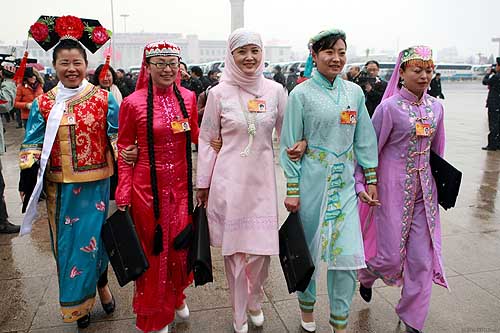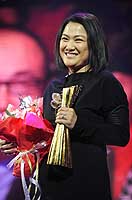|
 |
|
REPRESENTING THE FEW: Ethnic minority NPC deputies enter the Great Hall of the People to take part in this year's NPC session (XIAO YING) |
On the afternoon of March 8, Beijing's department stores and shopping malls were crowded with women on shopping sprees to celebrate International Women's Day. This year marks the 100th anniversary of the establishment of International Women's Day.
In 1949, the Chinese Government added Women's Day, which falls on March 8, into the country's official holidays. Chinese law stipulates female employees can take half a day off work on that day every year.
Roses were twice as expensive as normal, while chocolate was in strong demand. Salespeople spared no efforts in enticing female shoppers by offering attractive cosmetics gift packages and big discounts on clothes as they know women are the major purchasing power in any family.
In China, an increasing number of women have taken up jobs. Pregnancy is no longer a barrier hindering women's career as the Labor Law states clearly an employer cannot fire a woman if she is pregnant or during the time she is breastfeeding.
As a matter of fact, Chinese women are playing important roles in helping push forward the country's political, economic and social development. On March 3, the All-China Women's Federation, an organization for women in China founded in March 1949, granted awards to 10 excellent women who had made extraordinary achievements in their professional fields.
 |
|
Zhang Xin (CFP) | Zhang Xin, co-founder and co-CEO of Soho China, one of the largest real estate developers in China, was among them. After earning a master's degree at Cambridge University in 1992, she started a real estate development company together with her husband and helped build the company into a well-known property brand worth $2.6 billion.
Meng Xiaosi, head of China's delegation to the 54th Session of the Commission on the Status of Women at the UN Meeting to Commemorate International Women's Day, delivered a speech on March 1 which outlined China's achievements in bridging gender disparity.
Meng said the proportion of women among civil servants had increased from less than one third in 1995 to more than 40 percent at present. Now, there are more than 230 female officials at ministerial level, and 670 female mayors and vice mayors in more than 600 Chinese cities.
In 2008, the enrollment rate of female students was 99.6 percent, 0.1 percentage points higher than males. The numbers of female undergraduate, masters and doctoral students account for 49.86 percent, 48.16 percent and 34.7 percent respectively of all students and staff.
At present, women account for 45.4 percent of the work force in China, while the number of female entrepreneurs makes up a quarter of all businesspeople.
 |
|
WOMEN'S VOICE: Zhang Xiaomei (right), Editor in Chief of a fashion newspaper in China, speaks at a group discussion during this year's full session of the National Committee of the Chinese People's Political Consultative Conference, China's top political advisory body, along with other members representing women (XIAO YING) | In 2007, the average life expectancy of women in China was 75.3 years.
In spite of these impressive achievements, there are still some difficulties limiting women, such as low employment rates of female college graduates.
Chen Zhili, Vice Chairwoman of the Standing Committee of the National People's Congress (NPC) and President of the All-China Women's Federation, said before the opening of this year's NPC meeting the low competitiveness of women in some circumstances is mainly due to traditional ideas about women. But on the other hand, she said, some women's limited access to higher education also stops them from competing with men equally.
|
